Curated OER
Winter Wonderland: Internet Literature Project
Students, using the Internet, communicate with peers around the world about winter-themed books. They study authors, write book reviews, re-write endings, interview book characters, create scene dioramas, paint murals, and write...
Poetry Out Loud
Poems Put to Use
Why do we have to study poetry? Here is a lesson that demonstrates some of poetry's more practical and real-world applications for reluctant learners. Start by leading a brainstorming session about where poems or pieces of poems might be...
Curated OER
Heeding Advice
Compare and contrast various foreign perspectives on the George W. Bush administration's plans for military action. Middle schoolers read the article "Blair and Chirac Head to U.S. to Talks and a Show of Unity." Then, they analyze...
Curated OER
Twice Upon a Time: Multi-Cultural Cinderella
Engage your learners in a cross-cultural study by having them read, compare, and contrast various Cinderella stories from different cultures around the world. From this exercise, they will learn that plot element can seem...
Curated OER
Rockefeller's Revenge: Exxon and Mobil Unite
Study the impact and possible outcomes of the Exxon-Mobil merger in your language arts, social studies, or economics class. Secondary learners evaluate a series of graphs, write a paragraph interpreting the data, and engage in class...
National Endowment for the Humanities
A “New English” in Chinua Achebe’s “Things Fall Apart”: A Common Core Exemplar
To examine the “New English” Chinua Achebe uses in Things Fall Apart, readers complete a series of worksheets that ask them to examine similes, proverbs, and African folktales contained in the novel. Individuals explain the meaning...
Curated OER
Let Pharady Enjoy Her Childhood
A thought-provoking lesson which will provide your 5th graders with a world view. Pupils discuss children's rights here in the US and around the world, and do some comparisons. They watch a video, embedded in the plan, that shows a young...
Curated OER
Helpful Animals and Compassionate Humans in Folklore
Learners define elements of stories from around the world that include helpful animals. They explore animal character motivations and use graphic organizers to compare and contrast animal stories from different cultures.
Curated OER
Parody Hilarity
Upper grade and middle school writers study the art of parody. In this language arts lesson, learners study the work of Lewis Carroll, read and discuss parodies from the book, Alice in Wonderland, and construct their own parody based on...
Curated OER
Following the Leaders
Examine the historic election of Pope Benedict XVI and reflect on the challenges he faces as the new leader of the Catholic Church. This New York Times lesson investigates how other world leaders are chosen in different forms of...
Curated OER
Hey, Teacher, Leave My Kids Alone
What are the differences between homeschooling, traditional schooling, and unschooling? Middle and high schoolers examine the opinions of their peers on these varied types of education. After reading a New York Times article, they...
Curated OER
Literary Newspaper: Candide
Prejudice? Religious intolerance? Political sedition? Class distinction? Plight of women? Voltaire satire, anyone? A literary newspaper offers an opportunity for readers of Candide to make text-to-self and text-to-world connections as...
ReadWriteThink
Decoding the Dystopian Characteristics of Macintosh’s “1984” Commercial
Known as one of the most iconic advertisements of the 20th century, Macintosh's "1984" commercial has become more of a social statement. Present the ad to a new audience of viewers with a lesson focused on identifying dystopian...
Shakespeare Uncovered
All the Globe’s a Stage: Shakespeare’s Theatre
“All the world’s a stage,” exclaims Jaques in As You Like It, but it is the structure of the Globe stage and how that structure influenced Shakespeare’s plays that is the focus of an on-line research project. Class members visit a series...
Curated OER
Television Newscasts
When we watch news broadcasts on television, we receive a much more visual perspective than when we read the newspaper. How do sets, clothing, and music contribute to our understanding of the story? Compare American and Canadian news...
Alabama Department of Archives and History
Extra! Extra! Read All About It?
Remember the Lusitania! As part of their study of the causes of World War I, class members examine newspaper articles and propaganda posters about the sinking of the Lusitania and then craft their own news story about the event.
Curated OER
Deutschland und die Europäische Union (Germany and the European Union)
Introduce your language learners in German class to the European Union, including the historic developments, the current structure, and some of the political and social principles behind it with this instructional activity. In small...
The New York Times
I Don’t Think So: Writing Effective Counterarguments
When it comes to writing effective arguments, writers must do more than simply make a claim, counterarguments must be considered. Aspiring writers analyze counterarguments in editorials, and then learn how to write counterarguments in...
K20 LEARN
Voices from the Past: History and Literature
Art can enhance the understanding of history. That's the big idea in a instructional activity that has young scholars read Randall Jarrell's poem "The Death of the Ball Turret Gunner" and an excerpt from John Hersey's...
Curated OER
Lesson: Jazzy Stripes and Worlds
Every artist creates in his own unique way drawing from a variety of inspirational sources. Upper graders work to expand their understanding of the creative process by first analyzing a modern piece and then creating one. They listen to...
Maryland Department of Education
The Concept of Diversity in World Literature Lesson 10: Author's Purpose Seminar
Why did Chinua Achebe write "An Image of Africa: Racism in Conrad's Heart of Darkness" in response to Conrad's novel? As part of a study of Things Fall Apart, class members conduct a socratic seminar focused on Achebe's purpose and...
Maryland Department of Education
The Concept of Diversity in World Literature Lesson 11: The Historical/Biographical Approach to Literature
How affected is Thinks Fall Apart by Chinua Achebe's personal biography? Using a four corners strategy, and evidence from their readings, class members debate the degree of biographical influence in Achebe's novel.
Maryland Department of Education
The Concept of Diversity in World Literature Lesson 9: Debating Imperialism
To gain an understanding of Imperialism, class members read Rudyard Kipling's poem, "The White Man's Burden" and Mark Twain's essay, "To the Person Sitting in Darkness." Groups compare these perceptions of non-white cultures with the...
Maryland Department of Education
The Concept of Diversity in World Literature Lesson 7: Cultural Commentary
As part of their study of Things Fall Apart, class groups develop a multimedia presentation in response to the question, "In what ways does Achebe use literature as a means to express and comment on culture and history?"
Other popular searches
- World Languages Spanish
- World Languages Food
- Languages of the World
- Lesson Plans World Languages
- World Languages \ Food
- World Languages \\ Food
- World Languages + Food
- World Languages, French























